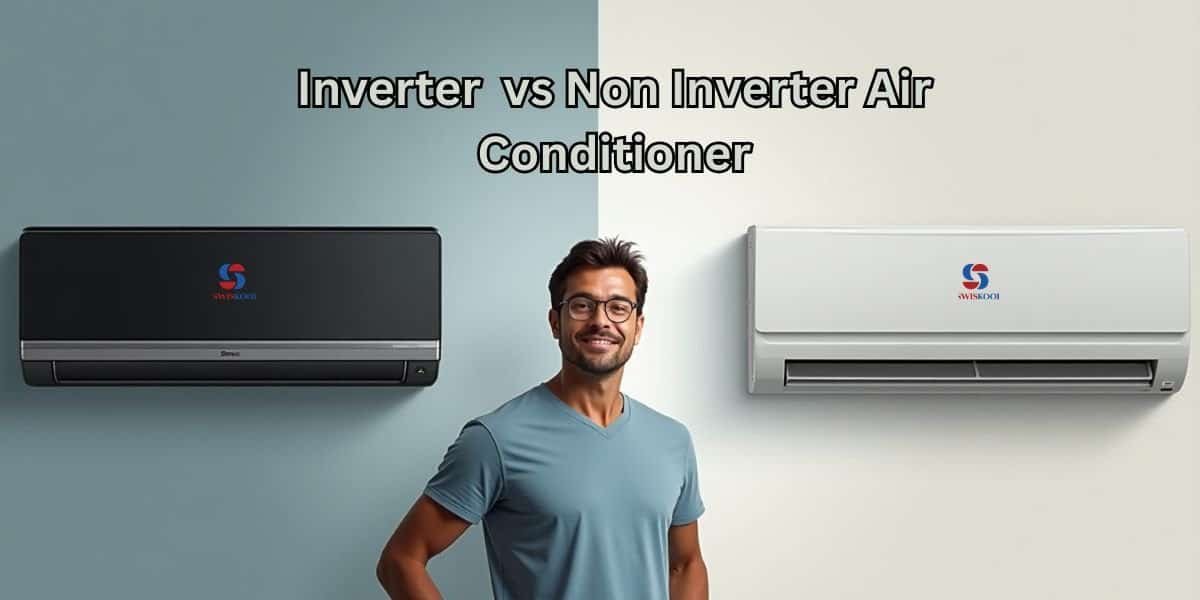Inverter vs Non-Inverter Air Conditioner: Which Is Better for You?
- Admin
- July 8, 2025
- No Comments
It is a big conflict to decide which is the best Air Conditioner Inverter or non-inverter. Everyone has their own advantages or disadvantages and in this article we are going to discuss the advantages and disadvantages of inverter or non inverter Air Conditioners so that it will help people to select the best budget friendly AC for themselves.
Knowledge about the basics
Inverter Air Conditioner
An inverter Ac maintain its speed according to the cooling demand of the room. It is a very best thing that when inverter achieve its desired speed, its compressor slows down its speed and hence uses low energy.
Non-Inverter Air Conditioner
Non-Inverter AC follows the off and on rule. The compressor works fast when cooling is required but when it achieves its desired cooling it stops but again when the temperature rises it starts from the starting again.
2. Efficiency in Energy Use
Inverter Air Conditioner
- In Inverter Acs, it uses less energy because in this system compressor does not turn on and off repeatedly.
- The energy needed to reach the desired temperature at the end of each cycle is decreased by maintaining the same room temperature.
- By using inverter Ac one can easily save electricity so it is also budget friendly.
Non-Inverter Air Conditioner
- Non-Inverter ACs have off and on systems. Its compressor follows start, stop cycle so it uses more energy.
- The compressor’s multiple restarts require a power increase, which raises energy consumption overall.
Inverter air conditioners are a superior option if energy consumption is a top concern, particularly in places with high electricity bills or if you use air conditioners for a long amount of time.
3. Efficiency of Cooling
Inverter Air Conditioner
- It is best because of its continuous operation especially in hot and humid environments.
- The compressor’s variable speed helps the air conditioner to immediately chill the space and consistently maintain the ideal temperature.
Non-Inverter Air Conditioner
- have a cooling cycle that rotates between starting and stopping, which may cause temperature swings and reduced comfort.
- It takes longer time to cool the room.
For improved cooling and ease, inverter air conditioners are more trustworthy, especially in warmer regions.
4. Noise Levels
Inverter Air Conditioner
- Smoother speed changes, which result in quieter operation.
- The compressor doesn’t start or stop quickly, which greatly lowers operating noise.
Non-Inverter Air Conditioner
- It makes noise when compressor starts and stops
- Frequent off and on cycle sometime is annoying
Inverter air conditioners provide a better experience if noise is an issue.
5. Starting Price
Inverter Air Conditioner
- It is expensive due to its advanced technology.
- The cost may be 40 –50% more than that of similar non-inverter models.
Non-Inverter Air Conditioner
- They are more appealing to people on low incomes or who use air conditioners rarely because they are initially less expensive to buy.
Non-inverter air conditioners might be appropriate if money is a primary concern and the unit is not used frequently. Nonetheless, take into account the long-term financial benefits of lower electricity costs with inverter models.
6. Upkeep & The strength
Inverter Air Conditioner
- Because the compressor experiences fewer hours of use, they are typically stronger.
- need certain maintenance, which can be a little more costly and could not be accessible in rural locations.
Non-Inverter Air Conditioner
- It has simple technology so it means it is very easy to repair it.
- However, the frequent starting and stopping can ultimately limit the compressor’s lifetime.
Inverter air conditioners frequently offer an advantage in terms of long-term strength and fewer issues, even if they require skilled technicians for maintenance.
7. Effects on the Environment
Inverter Air Conditioner
- Reduce the amount of electricity you use, which will reduce the release of greenhouse gases.
- Many models use eco-friendly refrigerants, which decrease ozone layer and environmental harm.
Non-Inverter Air Conditioner
- Non-inverter ACs use more energy which means a direct impact on the environment.
- Older versions may use expired refrigerants that are damaging to the environment.
Inverter air conditioners are the more environmentally friendly choice.
8. Suitability Dependent on Usage
Inverter Air Conditioner
- Use ACs daily or for a long time.
- Live in a location with unpredictable temperatures.
- Value comfort and regular room temperature.
- Want to save on long-term electricity bills.
- Are looking for a peaceful and environmentally friendly solution.
Non-Inverter Air Conditioner
- Use the air conditioner for shorter periods of time.
- seek a smaller initial investment and are on a limited budget.
- Don’t mind temperature changes or some noise.
Last Words
In short,an inverter air conditioner is the best and first choice if you give importance to comfort and cost savings and see your air conditioner as a long-term investment. Although it may be more expensive at first but soon you will feel that it was worth it to buy it. On the other hand, a non-inverter air conditioner might be an appropriate choice if your cooling requirements are low and cost is important to you.



